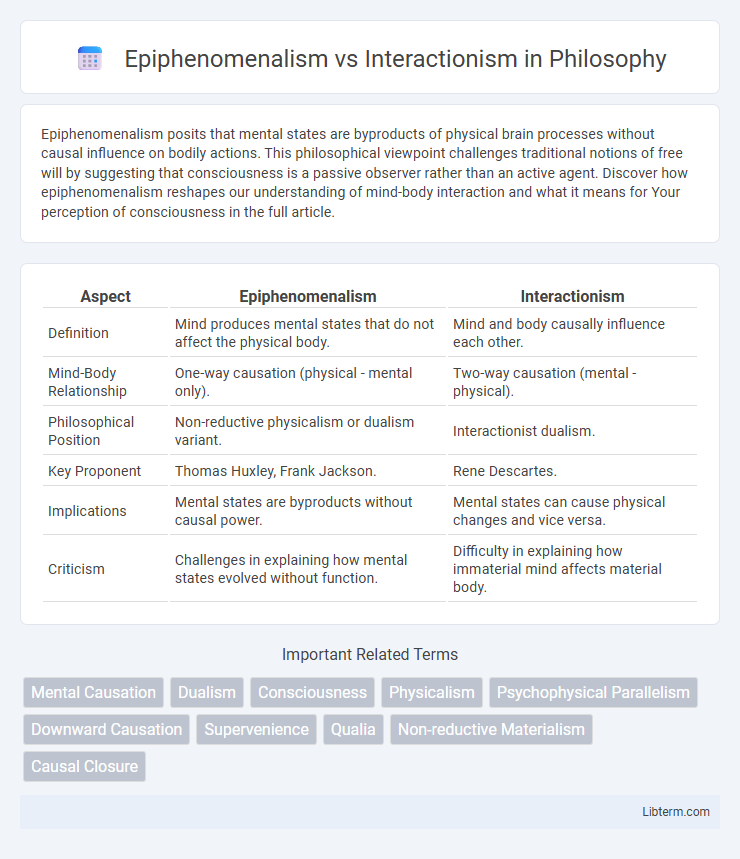Epiphenomenalism posits that mental states are byproducts of physical brain processes without causal influence on bodily actions. This philosophical viewpoint challenges traditional notions of free will by suggesting that consciousness is a passive observer rather than an active agent. Discover how epiphenomenalism reshapes our understanding of mind-body interaction and what it means for Your perception of consciousness in the full article.
Table of Comparison
| Aspect | Epiphenomenalism | Interactionism |
|---|---|---|
| Definition | Mind produces mental states that do not affect the physical body. | Mind and body causally influence each other. |
| Mind-Body Relationship | One-way causation (physical - mental only). | Two-way causation (mental - physical). |
| Philosophical Position | Non-reductive physicalism or dualism variant. | Interactionist dualism. |
| Key Proponent | Thomas Huxley, Frank Jackson. | Rene Descartes. |
| Implications | Mental states are byproducts without causal power. | Mental states can cause physical changes and vice versa. |
| Criticism | Challenges in explaining how mental states evolved without function. | Difficulty in explaining how immaterial mind affects material body. |
Introduction to Mind-Body Theories
Epiphenomenalism asserts that mental states are byproducts of physical brain processes without causal efficacy, emphasizing a one-way relationship from body to mind. Interactionism, contrastingly, maintains a bidirectional causal interaction where mental states can influence physical processes and vice versa. These foundational mind-body theories grapple with explaining consciousness and the nature of mental causation within philosophy of mind and neuroscience.
Defining Epiphenomenalism
Epiphenomenalism defines mental states as byproducts of physical brain processes, asserting that these mental phenomena have no causal influence on the physical world. This theory posits that consciousness and subjective experiences arise from neural activity but cannot affect neuronal functioning or behavior. In contrast, interactionism argues that mental states and physical states mutually influence each other, allowing consciousness to have causal powers over bodily actions.
Understanding Interactionism
Interactionism posits a bidirectional causal relationship between the mind and body, asserting that mental states can influence physical states and vice versa. This theory emphasizes the dynamic interplay where consciousness actively affects neural processes, contrasting with epiphenomenalism, which views mental events as mere byproducts of physical brain activity without causal power. Neuropsychological studies and experiments in cognitive neuroscience support interactionism by demonstrating how intentional mental actions can trigger measurable physiological changes.
Historical Background and Key Thinkers
Epiphenomenalism, originating in the 19th century, was notably advanced by philosopher Thomas Huxley, who argued that mental states are byproducts of physical processes in the brain without causal power. Interactionism, with roots tracing back to Rene Descartes in the 17th century, posits a bidirectional causal relationship between mind and body, with Descartes himself emphasizing dualism in works like "Meditations on First Philosophy." Later key thinkers, such as William James, expanded interactionist views by exploring conscious experience's influence on physical action, contrasting sharply with the epiphenomenalist stance.
Core Arguments for Epiphenomenalism
Epiphenomenalism argues that mental states are causally inert by emphasizing the unidirectional flow from physical brain processes to conscious experience, supported by neuroscientific evidence showing brain activity preceding conscious awareness. Proponents highlight the explanatory power in accounting for the evolutionary development of consciousness as a byproduct rather than a causal agent. This view challenges the interactionist position by questioning the empirical basis for mental causation in physical events.
Core Arguments for Interactionism
Interactionism asserts that mental states causally influence physical states, supporting the intuitive experience of agency and decision-making. Empirical evidence from neuroscience shows bidirectional brain-mind interactions, challenging the epiphenomenalist view that mental phenomena are mere byproducts without causal power. Interactionism also addresses the explanatory gap by integrating subjective consciousness with physical processes, emphasizing their reciprocal effects.
Philosophical Implications and Challenges
Epiphenomenalism posits that mental states are byproducts of physical processes in the brain, raising challenges about the efficacy of consciousness in causally influencing behavior and questioning the role of free will. Interactionism argues for a two-way causal relationship between mind and body, but faces difficulties explaining how immaterial mental events can physically affect the brain without violating conservation laws. Both theories provoke ongoing debate about the nature of mind-body dualism, the causal closure of the physical, and the metaphysical status of consciousness in philosophical and scientific discourse.
Scientific Perspectives and Evidence
Scientific perspectives on epiphenomenalism emphasize that mental states are byproducts of physical brain processes without causal influence, supported by neuroimaging studies showing brain activity preceding conscious awareness. Interactionism, however, posits a bidirectional causal relationship between mind and body, with some experimental evidence from psychophysiology and anomalous phenomena suggesting mental states can affect neural activity. Despite ongoing research, the dominance of physicalist neuroscience challenges interactionism, while epiphenomenalism faces criticism for not explaining the apparent efficacy of conscious decision-making.
Impact on Consciousness Studies
Epiphenomenalism posits that consciousness is a byproduct of physical brain processes without causal efficacy, challenging the notion of free will in consciousness studies. Interactionism asserts a bidirectional causal relationship between mind and body, supporting theories that consciousness can influence physical states. These contrasting views shape research on the nature of mental causation, neural correlates of consciousness, and the development of integrative models in cognitive science.
Comparative Analysis and Future Directions
Epiphenomenalism posits that mental states are byproducts of physical brain processes without causal influence on bodily actions, whereas Interactionism asserts bidirectional causality between mind and body, emphasizing reciprocal influence. Comparative analysis highlights that Epiphenomenalism faces challenges explaining intentional actions and mental causation, while Interactionism grapples with conflicts in physicalist frameworks and conservation laws. Future research directions focus on integrating neuroscientific findings with quantum mechanics and exploring emergentist models to reconcile mental causality with physical laws.
Epiphenomenalism Infographic

 libterm.com
libterm.com